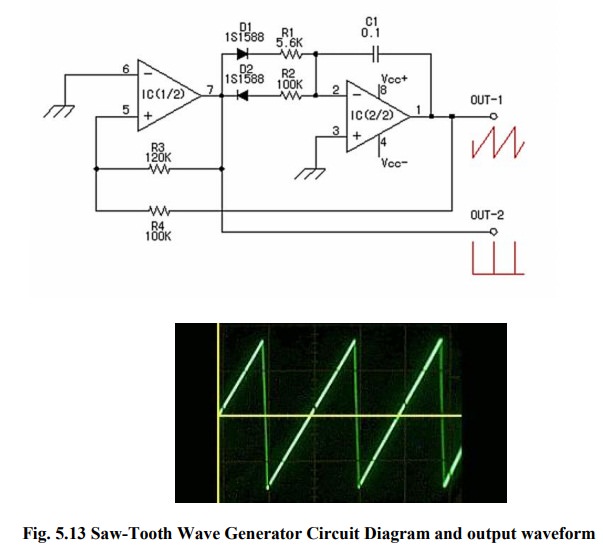Waveform Generators - Saw-Tooth Wave Generator | Linear Integrated Circuits : Waveform Generators and Special Function ICs
Chapter: Linear Integrated Circuits : Waveform Generators and Special Function ICs
Saw-Tooth Wave Generator
Saw-Tooth
Wave Generator

The
saw tooth wave oscillator which used the
operational amplifier. The composition of this circuit is the same as the
triangular wave oscillator basically and is using two operational amplifiers.
At
the circuit diagram above, IC(1/2) is the Schmitt circuit and IC(2/2) is the Integration circuit. The difference
with the triangular wave oscillator is to be changing the time of the charging
and the discharging of the capacitor. When the output of IC (1/2) is positive
voltage, it charges rapidly by the small resistance (R1) value.
(When
the integration output voltage falls) When the output of IC(1/2) is negative
voltage, it is made to charge gradually at the big resistance(R2) value. The
output waveform of the integration circuit becomes a form like the tooth of the
saw. Such voltage is used for the control of the electron beam (the scanning
line) of the television,
When
picturing a picture at the cathode-ray tube, an electron beam is moved
comparative slow. (When the electron beam moves from the left to the right on
the screen). When turning back, it is rapidly moved.(When moving from the right
to the left).
Like
the triangular wave oscillator, the line voltage needs both of the positive
power supply and the negative power supply. Also, to work in the oscillation,
the condition of R3>R4 is necessary. However, when making the value of R4
small compared with R3, the output voltage becomes small. The near value is
good for R3 and R4
The
oscillation frequency can be calculated by the following formula.

With
the circuit diagram,the oscillation frequency is as follows.
f
= (1/2C (R1+R2))*(R3/R4)
=
(1/(2x0.1x10-6x(5.6x103+100x103))x(120x103/100x103)
=
(1/(21.12x10-3))x1.2
=
56.8 Hz
Related Topics